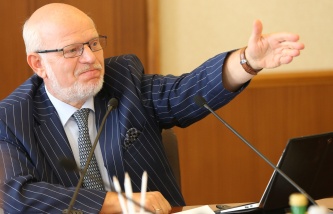Tensions between Latvia and Russia have been growing, especially since Latvia has just joined the Eurozone. Prominent Latvians have accused Russia of using “soft power” to influence internal affairs. Now, Latvia has banned the justification or denial of either Nazi or Soviet occupation during World War II. In other words, Latvia is attempting to establish both Soviet Russia and Nazi Germany as opposing foreign occupiers, rather than liberators. The Russian government is pushing back, arguing that to deny the Soviet liberation of Latvia is to champion Nazism itself. — Ed.
The Latvian Saeima decision to criminalize denial of the “Nazi and Soviet occupation” continues the efforts to glorify Nazism as part of the state policy and violates the international law. This is what Konstantin Dolgov, the Russian Foreign Ministry Commissioner for human rights , democracy and the rule of law, said speaking to an ITAR-TASS correspondent.
“This is a continuation of the flawed policies pursued by Latvia, and, unfortunately, not only by Latvia, but also by neighboring countries – policies trying to equate Nazi Germany with the Soviet Union,” said the diplomat.

The head of the HRC reminded that it was the Nuremberg Tribunal that gave the assessment of the German occupation
“This stance amounts to actual glorification of Nazism and everything that is associated with glorification of Nazism,” he continued. “This is a stance that can only be described as a flagrant violation of international law, as in fact such policy denies the decisions by the Nuremberg Tribunal, that are part of contemporary international law underlying, among other things, the UN Charter, of which Latvia is a signatory.”
“A country cannot support the UN Charter, consider itself a democratic state, and at the same time deny the fundamental norms and principles of international law,” added Dolgov.
“With regard to this particular decision, let’s see how the executive branch of the Latvian government reacts to it. Such policies can be only judged negatively,” summed up the diplomat.
A similar position is held by the chairman of the Duma Committee on Foreign Affairs, Alexei Pushkov. Speaking at the plenary session of the lower chamber, the MP noted that the reference to the Nazi occupation “is made in the Latvian bill with only one purpose, that is to make it look less outrageously provocative.”
“In fact, it is clearly directed against our country,” he said. “Now we see a lot of attempts to belittle and distort our country’s role in the defeat of the Third Reich,” stated the head of the committee.